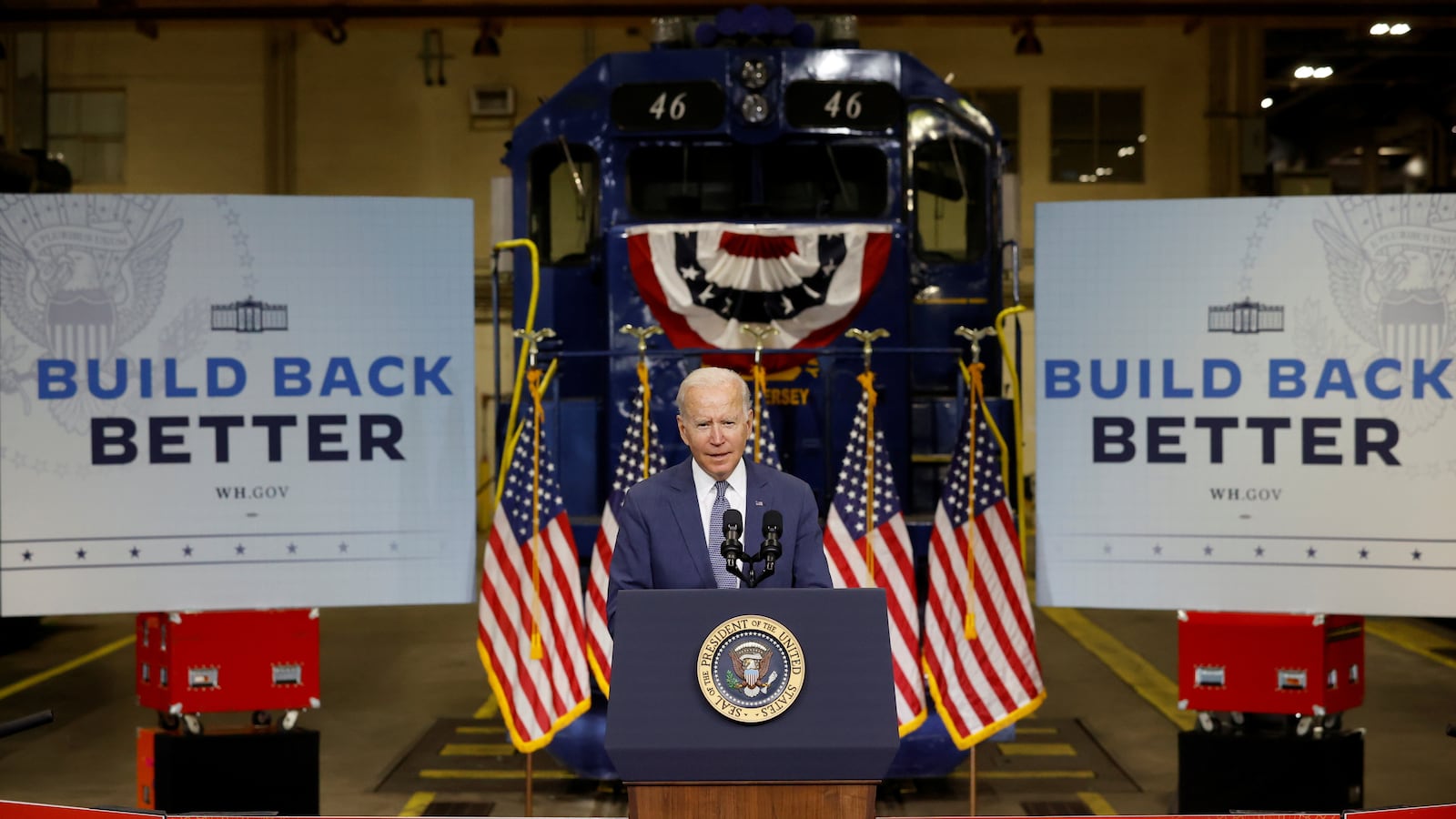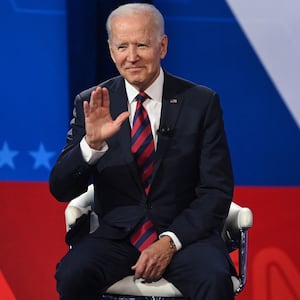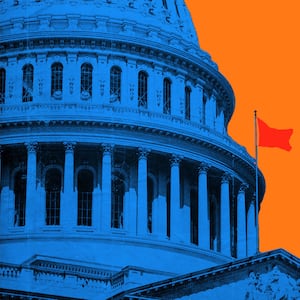After months of negotiations and major concessions on some of his most prized policy goals, President Joe Biden told the nation on Thursday that he had finally reached a framework for one of the most expansive social spending packages in modern history.
The stakes of its passage, Biden said, are existential for the future of the nation as a global leader.
“We face an inflection point as a nation,” Biden said, pointing to backsliding in American education, infrastructure, and social welfare that risks ending the so-called “American Century.”
“These are not about left versus right, or moderate versus progressive, or anything else that pits Americans against each other,” Biden said, but about “competitiveness versus complacency.”
Flanked by Vice President Kamala Harris, Biden appeared both cautious and confident about the framework’s ability to survive a vote in the U.S. Senate.
“After months of tough and thoughtful negotiations, I think we have—I know we have a historic economic framework,” Biden said, correcting himself mid-sentence. “Nobody got everything they wanted, including me—but that’s what compromise is.”
Biden’s remarks from the East Room of the White House sounded much like the same speech he has been making in support of his vast infrastructure and social spending package since the beginning of his presidency, complete with digressions about the virtues of electric vehicles and broadband internet connectivity. But as he made the pitch to House Democrats earlier on Thursday morning, Biden made the stakes much more immediately clear, telling his fellow party members Democratic control of the federal government is at stake.
“We are at an inflection point” where “the rest of the world wonders whether we can function,” Biden told House Democrats, according to a source familiar with his remarks behind closed doors.
With the Republican Party universally opposed to the package and with trillions of dollars in key Democratic priorities stripped from the framework by conservatives in his own party, Biden said, his own presidency is on the line. Either House Democrats could back twin infrastructure and social spending packages that would be, he claimed, more significant than those achieved by both Lyndon Johnson and Franklin Delano Roosevelt, or it could destroy the party’s prospects for years.
“I don’t think it’s hyperbole to say that the House and Senate majorities and my presidency will be determined by what happens in the next week,” Biden said. “I need you to help me. I need your votes.”
Before Biden's trip to Capitol Hill, the White House unveiled what it hopes will be the final framework for a vast social spending bill, after months of negotiations with congressional Democrats whittled away many of Biden’s biggest campaign promises but still left huge investments in child care, education, and a tax overhaul intact.
The administration is “confident” that the framework and its $1.75 trillion price tag will win the support of “every Democratic senator and pass the House,” a senior administration official told reporters ahead of Biden’s call with congressional Democrats on Thursday morning.
But asked whether the White House had secured the commitment of Sens. Joe Manchin of West Virginia and Kyrsten Sinema of Arizona—two holdouts whose opposition to a plethora of social spending items have cut the size of the bill in half—administration officials would only say that they would not speak for any congressional Democrats.
Among the items totally cut from the package include paid family leave, free community college, and empowering the government to negotiate on prescription-drug prices for Medicare and Medicaid, all of which were major campaign promises that are widely popular with the American people—and with the House progressives, who will be key to the passage of Biden’s “hard” infrastructure package.
But what remains still amounts to one of the largest social spending packages since the Great Depression, paid for, officials said, by an increase in taxes on hyperwealthy individuals and corporations that will not only pay for the new spending but will actually reduce the deficit.
“No one making less than $400,000 will have their taxes raised. Period,” an official said, invoking the one promise Biden made on the campaign trail that has been sacrosanct throughout the negotiation process. The tax increases, officials said, will come in the form of a 15 percent minimum tax on corporations with more than $1 billion in annual earnings, a 1 percent surcharge on stock buybacks, and by applying a 5 percent tax rate increase on income above $10 million, and an additional 3 percent on income above $25 million.
“It is entirely paid for by rewarding work, not wealth,” an administration official said. “When you put it all together, the price tag for these investments… will be zero, and will in fact reduce the deficit.”
The details of the spending package, while missing major components of the president’s “Build Back Better” agenda, still touch on most of the president’s major areas of commitment: child care, climate change, health care, and investments in social services and tax cuts aimed at the middle and working classes.
The bill would create universal free preschool for all 3- and 4-year-old children in settings ranging from public schools to Head Start programs; add up to $300 per month in the child tax credit, and would expand child-care access to 90 percent of families with young children.
According to an outline of the framework, parents who are working, looking for work, or are participating in an education or training program who make less than 2.5 times their state’s median income “will receive support to cover the cost of quality care based on a sliding scale,” capped at 7 percent of their income. For a hypothetical two-parent household with one toddler earning $100,000 per year in income, the framework would produce more than $5,000 in child care savings annually.
The framework, an official said, would amount to “the most transformative investment in children and caregiving in generations.”
On climate change, the framework would provide clean-energy tax credits that would, for example, cut the cost of installing rooftop solar on a private residence by 30 percent, and would extend tax credits for electric vehicles that would lower the cost of an electric vehicle by as much as $12,500 for middle-class Americans.
“The framework’s $555 billion investment represents the largest single investment in our clean energy economy in history,” the administration’s writeup claims, with investments in clean energy technology that would be built in America.
The package would also include “the largest expansion of health care coverage since the Affordable Care Act,” an administration official said, decreasing the number of uninsured Americans by seven million people by reducing premiums for plans bought on public health exchanges, closing the Medicaid coverage gap, and expanding Medicare to include hearing benefits—although it would not include a similar expansion in vision and dental care, a key promise Biden made in the early days of negotiations.
Another major hole in the plan, Biden’s vows to create free community college, has been replaced by a $550 increase in the maximum Pell Grant amount for more than 5 million students enrolled in public and private nonprofit colleges. The program would also be extended to so-called “DREAMers,” children of migrants who were brought into the United States as young children.
The framework would also make a $100 million investment in the immigration system to address processing backlogs for immigration courts and asylum claims, as well as provide representation for those going through immigration proceedings.
Administration officials made it clear that many of the missing issues were simply not passable with the opposition of Manchin and/or Sinema, telling reporters that “there are not yet enough votes to get something across the line” on prescription drug negotiations, for example, but vowed to “keep fighting” in the future on some of the president’s key promises.








